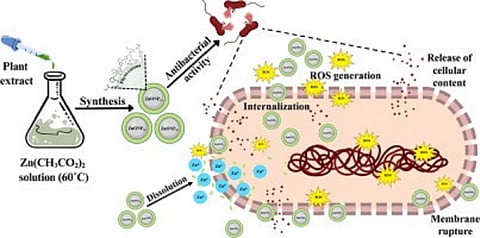

Researchers at the National Institute of Technology (NIT) Rourkela have developed an eco-friendly method to kill harmful bacteria, including those resistant to antibiotics.
The team used extracts from medicinal plants to produce potent antibacterial agents that are both effective and environmentally safe.
The study addresses the growing challenge of antimicrobial resistance, caused by the overuse of conventional antibiotics leading to the emergence of drug-resistant 'superbugs.'
Scientists worldwide are actively seeking alternative approaches to combat these pathogens.
Published in the journal Surfaces and Interphases, the study was co-authored by Dr. Suman Jha, Associate Professor, Department of Life Science, along with research scholars Kumari Subham, Sonali Jena, and Monalisha Ojha.
The research focuses on zinc oxide nanoparticles — materials so minute that tens of thousands can fit across a human hair.
These nanoparticles attack bacterial cells by producing reactive molecules that damage membranes, disrupt normal functions, and block vital processes, ultimately killing the bacteria.
Conventional methods of synthesising these nanoparticles often involve toxic chemicals that pose risks to humans and the environment.
To overcome this, the NIT Rourkela team adopted a green synthesis approach, using leaf and petal extracts from Marigold, Mango, and Eucalyptus plants to convert zinc salts into zinc oxide nanocrystals enriched with natural phytocompounds.
